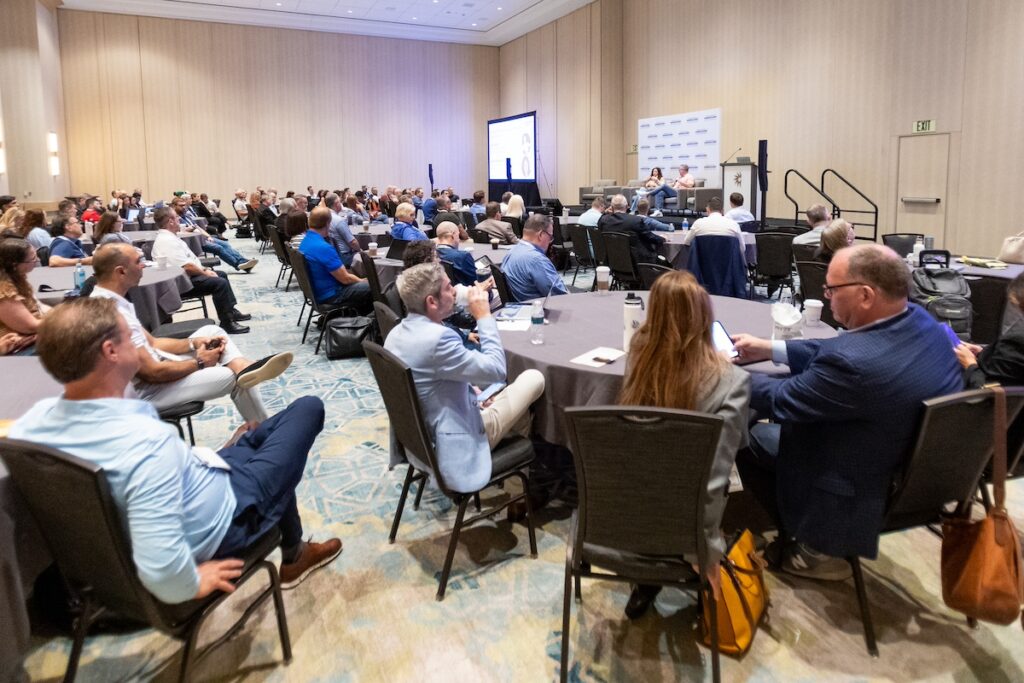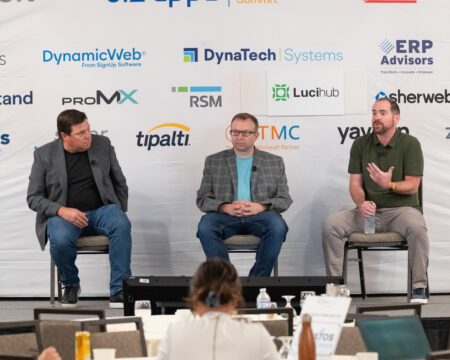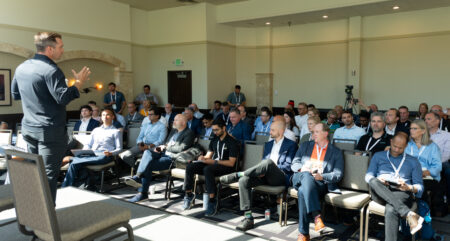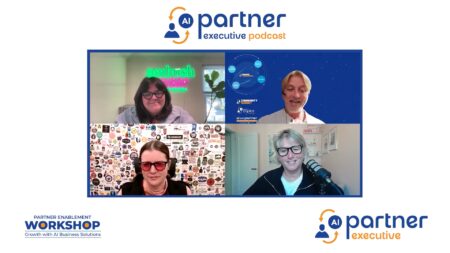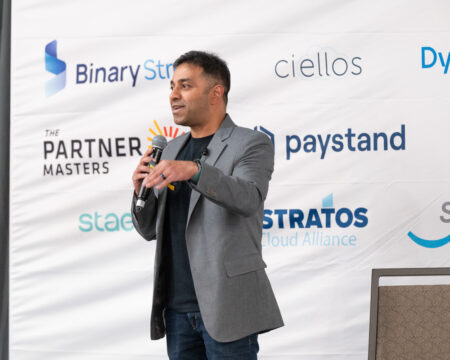
The Partner Enablement Workshop brought focus to what it means to thrive in the AI era. Sessions throughout the day, led by Microsoft executives, industry experts, and partner organizations, reinforced themes around AI adoption and becoming a “frontier firm,” industry expertise, marketing, partnerships, and more.
Becoming a Frontier Firm
Microsoft’s Cecilia Flombaum encouraged partners to become “customer zero,” using AI internally before selling or implementing it for others. “It’s going to get repetitive,” she said, “but the only way you’re going to convince your customers to adopt this is to use it yourself.”
Leading partners are embedding AI throughout their organizations, with the goal of becoming familiar with the technology. “Building agents is a skill we need to start developing, for internal use and as a core part of business process transformation,” she explained.
Customers know they need to adopt AI, but the question is where to start. “Partners must help them build that journey,” she told the audience.
She also touched on evolving buyer dynamics. Decision-making committees today are no longer limited to CIOs and CFOs, but include sales, marketing, and operations teams who are exploring how AI can reshape workflows.
Enabling Partner Success Through Marketing
Later in the morning, 3 marketing-focused sessions, led by Microsoft’s Rachel Profitt, Marketing Copilot’s Marie Wiese, and Sam Bush of Ambush on Air, explored how partners can drive growth and customer success by embracing process-led approaches, leveraging AI in marketing, and strengthening account-based strategies.
Process-Led Transformation
Profitt’s session emphasized the role of business processes in technology adoption. She introduced the Microsoft Business Process Catalog, a resource that standardizes processes across industries and platforms.
She noted that automation should enhance, not replace, human decision-making, and partners must first optimize processes before automating them. The catalog empowers partners to design, implement, and market solutions that align with real customer needs. By shifting from ‘product-led’ to ‘process-led’ sales and marketing, partners can better communicate business outcomes and accelerate success.
AI-Enabled Marketing
Wiese expanded on this foundation by exploring the evolution of marketing in the age of artificial intelligence. She described the “marketing brain,” which is a hybrid intelligence model that unifies data, content, and human insight to generate leads and conversions. She advocated for a coordinated, data-driven approach, where unique differentiation and deep technical content set partners apart. Overall, Wiese encourages partners to integrate AI tools with human expertise.
Winning with Account-Based Marketing
Bush brought the discussion full circle with a practical guide to account-based marketing (ABM). She stressed the necessity of personalized engagement, intent data, and business alignment across teams. ABM messaging should be catered to different stakeholders, and similar to Wiese, Bush encouraged the inclusion of a “human edge.” ABM, when combined with a process-led mindset and AI-enabled marketing, creates a strong opportunity for partner growth.
Alliances in the AI Era
Building on the premise of partner growth, IAMCP’s Paul Solski defined why alliances matter in the AI era. He welcomed other partners, including C5 Insight’s Geoff Ables, ArcherPoint by Cherry Bekaert’s Greg Kaupp, Jeff Goldstein of Queue Associates, MXS Commerce’s Sam Zameck, and Adam Kovacs of Hubdrive, whose message was strong: in an AI-driven market, collaboration is the new competitive edge.
Solski explained that “most partnerships fail not because of technology, but because of lack of structure and trust.” Effective alliances depend on clear business cases, defined roles, and mutual accountability. “Having fewer, high-quality partners who are proactive and self-sufficient is far better than having many who don’t deliver.”
Panelists shared examples of partnerships that worked and why. Goldstein described his collaboration with MXS Commerce: “We spent hundreds of hours developing a joint app that combines our two solutions. Once we both committed financially and strategically, the results came quickly.”
Ables and Kaupp honed in on the importance of open communication. “The most valuable partnerships are the ones where we can talk about tough business issues, learn from each other, and not worry about competing,” stated Ables.
AI amplifies the need for collaboration. No single partner can master every vertical, every use case, or every regulation. By sharing IP, insights, and talent, partners can create more complete solutions for customers and accelerate growth together.
Unlocking the Power of Microsoft Copilot Studio
To close out the workshop, Microsoft’s Dewain Robinson and Christian Memije provided an in-depth look into Copilot Studio to understand how the platform is reshaping digital workflows.
Copilot Studio Overview
Copilot Studio is Microsoft’s end-to-end platform for building and managing conversational agents. The platform acts as a “conversational orchestrator,” enabling the integration of various AI agents, knowledge bases, and tools. This architecture allows organizations to create agents that can communicate, collaborate, and execute tasks, all while maintaining control over data sources and responses.
Interoperability
Microsoft’s approach to agent building supports protocols from across the industry and fosters interoperability. During a live demo, Robinson and Memije re-emphasized the concept of the “frontier firm” and demonstrated how an agent in Copilot Studio can provide assessment tools to help companies evaluate their AI maturity level and offer guidance for partners who are on the journey.
Live Demo
During the demo, attendees saw the development of partner enablement agents, the use of knowledge bases, and the integration of reusable modules like PDF generators. The two showcased how agents can be tailored for specific business needs, like becoming a “frontier firm” and partner enablement.
Extensibility
The session wrapped up with a look at Copilot Studio’s extensibility. Attendees learned how to add new tools, such as prompt analyzers and other connectors, and create agents for specialized tasks. This approach ensures that organizations can continuously expand their digital workforce.
Final Thoughts
The Partner Enablement Workshop defined the role of AI in shaping the future of business and encouraged partners to embrace innovation from within. Success in the AI era requires intentional alliances, strategic thinking, targeted marketing, and internal adoption.

